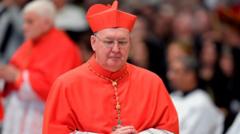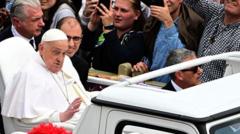Pope Francis, who passed away at 88, left an indelible mark on the Catholic Church through his commitment to social issues. His death has prompted an outpouring of tributes from world leaders and the public alike, emphasizing his legacy of inclusivity and compassion. The Church now faces the task of selecting a successor who may continue or challenge his transformative vision.
World Mourns the Loss of Pope Francis: A Legacy of Compassion and Inclusion

World Mourns the Loss of Pope Francis: A Legacy of Compassion and Inclusion
As global leaders and citizens express their sorrow over Pope Francis's passing, the impact of his unwavering advocacy for the marginalized and the poor is highlighted, alongside anticipation for the future direction of the Catholic Church.
Pope Francis, who died at the age of 88 on April 21, 2025, left believers and world leaders in mourning as they reflected on his compassionate legacy of serving the marginalized and advocating for the poor. Known for his profound influence over more than one billion Catholics, Francis was remembered as a champion of inclusivity, working tirelessly to reshape the Church into an institution that embraced diversity and addressed urgent social issues.
His death was announced in the early morning in a solemn statement from the Vatican. “At 7:35 this morning, the Bishop of Rome, Francis, returned to the house of the Father,” said Cardinal Kevin Farrell. Mourners gathered at St. Peter’s Square, many expressing disbelief that his life would end so soon after he appeared in public to bless attendees for Easter Sunday.
Francis’ papacy lasted 12 years, during which he made significant strides in confronting the Church’s sexual abuse crisis and the complexities of its financial operations. His determination to focus on migrants and societal issues became even more pronounced in his last public messages, resonating with a call for compassion in an increasingly polarized world.
The leadership of the Catholic Church must now undertake the expatriate task of selecting a new pope who can follow in Francis’s footsteps or revert to the previous, more conservative approach. This period of vacancy, termed *sede vacante*, places Cardinal Farrell in a temporary leadership role as the Church prepares for the upcoming conclave.
Cardinal Farrell, who will oversee day-to-day operations but cannot make major decisions, indicated that tributes continued to pour in, espousing Francis' impact on the lives of many. Global leaders, including former U.S. President Barack Obama and United Nations Secretary-General António Guterres, shared their condolences, applauding Francis for his dedication to humanity and moral clarity. Obama noted that despite ideological differences, Francis's ability to inspire goodness in people was universally acknowledged.
The late pope's progressive reforms shifted the church's dynamics, appointing bishops who reflected his values and fostering a leadership that engaged with contemporary moral challenges, from climate change to social justice. In his final words, Francis reiterated the importance of compassion for vulnerable populations, emphasizing the need to build bridges, not walls.
With the shock of his passing still palpable, many mourners expressed a deep sense of loss not just for a religious figure, but for a visionary leader. The upcoming conclave has become a focal point of speculation regarding potential successors who might either advance Francis's inclusive agenda or retrace steps towards conservatism, leaving the global Catholic community at a crossroads. As the Church reflects on his remarkable tenure, the lessons of Pope Francis's teachings will serve as a guiding light for those who seek to walk in his footsteps.





















